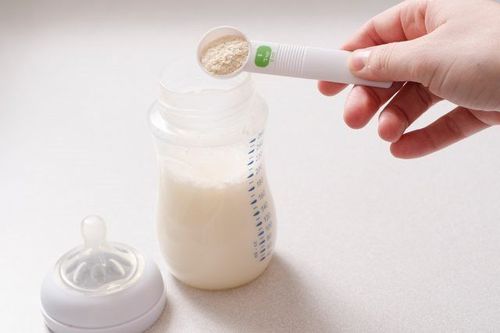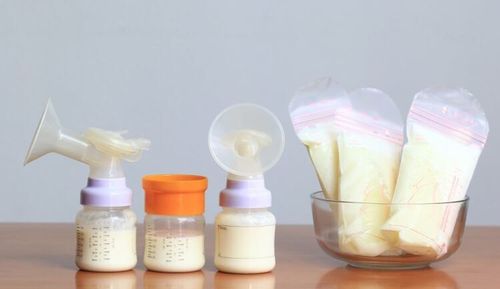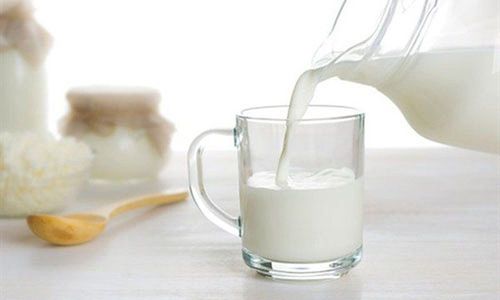This is an automatically translated article.
The article is professionally consulted by Master, Doctor Huynh Bao Toan - Department of Pediatrics - Neonatology - Vinmec Nha Trang International General Hospital.Breast milk is the best source of nutrition for babies, but for many reasons, some mothers do not have enough milk to feed their babies, must supplement with formula milk for babies. Many mothers wonder if it is possible to mix breast milk and formula together?
1. Can a baby drink breast milk and formula at the same time?
There is no denying that breast milk has many benefits for babies. In addition to meeting nutritional needs, breast milk also provides antibodies that protect babies from infections and may even reduce the risk of sudden infant death syndrome.Plus, breastfeeding is also great for first-time moms. Breastfeeding helps mothers recover faster, helps fight postpartum depression and reduces the risk of some cancers.
The American Academy of Pediatrics and the World Health Organization both recommend exclusive breastfeeding for the first 6 months of life. However, in reality, not everyone can do this.
With the thought of having to get breast milk to breastfeed, the mother gradually exhausted and fell into a state of depression.
In fact, research has shown that using formula in combination with breastfeeding for infants who lose weight while in the hospital has no negative effects on breastfeeding and actually reduces the rate of birth. neonatal hospitalization rates.
So breastfeeding is great for your baby, but if you can't actually do it because you don't have enough milk or for some other reason, formula is also full of vitamins. , minerals, carbohydrates, fats and proteins that babies need for growth and development.
Formula can meet the nutritional needs of each baby, while allowing parents to have time for themselves.
If you feel overwhelmed, overtired or simply don't have enough milk for your baby, consider adding formula to continue your breastfeeding journey.
While breastfeeding is encouraged as much as possible, you may be able to find another method that works for you and your family while ensuring normal development for your baby .
The combined use of formula and breast milk still provides you and your baby with amazing health benefits, also as an alternative when a medical or life condition makes breastfeeding Mom absolutely can't.
Before you start incorporating formula into your baby's diet, you should consult your doctor or nutritionist. They will help you determine how much formula is in each feeding or in a 24-hour period.

Nuôi con bằng sữa mẹ là việc làm rất tốt cho trẻ ở giai đoạn sơ sinh
Gradually adjust your baby's feedings when adding formula to your baby's diet makes it easier for you and your baby to make the transition from exclusive breastfeeding to breastfeeding.
2. Why mix breast milk and formula?
Here are some reasons why you must combine formula and breast milk for your baby2.1 You are not producing enough milk If you are having difficulty producing enough milk to meet your baby's needs, you Supply can be increased by drinking more water, eating better and breastfeeding more often.
However, sometimes despite the best efforts of the mother, breast milk still does not meet the needs of the baby. Hormonal changes, previous breast surgery, certain medications, and even age can affect breast milk production.
In addition, you can consult with medical experts on how to choose infant formula suitable for location and age, helping children supplement with necessary micronutrients for development.
2.2 You have multiple children A lack of milk supply can also affect mothers of twins or multiple babies. Keeping up with the needs of two or more babies can leave you feeling drained and your breast milk depleted - even if the babies are still hungry.
Combination feeding of breast milk and formula could be the solution you are looking for. Whatever routine you want to establish, give your child time to get used to it and adjust.
2.3 You need more sleep (and rest) Taking care of your baby can often leave you feeling exhausted and craving a full night's sleep. Asking a loved one to support you in feeding your baby gives you time to rest.
If at night, no one can help you, consider giving your baby some formula before bed, this will help them stay full longer and sleep better.

Thiếu ngủ sau sinh có thể ảnh hưởng đến sức khỏe của người mẹ
3. Is it safe to mix formula with breast milk?
If you are wondering if you can mix breast milk and formula in the same bottle, the answer is yes!It is important to observe some safety guidelines when doing this.
Prepare formula according to instructions
If you are using a powdered or concentrated formula, you will need to prepare the formula first according to the instructions, making sure to add the correct amount of distilled or safe drinking water.
Once you have mixed the correct amount of formula and water, you can add breast milk.
Note: never use breast milk in place of water in the formulating process. Maintaining the correct ratio according to the water formula and then adding breast milk separately ensures you won't change the nutritional composition of the formula.
Adding too much water to formula can dilute nutrients, while adding not enough water can put pressure on the baby's kidneys and digestive tract, leading to dehydration. In extreme cases, this can also lead to neurological problems in the child.
If you are using pre-mixed formula, no further steps are needed before combining with breast milk.
Store properly prepared formula
There are different rules for storing, using and disposing of breast milk and formula.
Breast milk can be frozen in food grade plastic containers for 6 months. Once removed from the freezer, breast milk can be kept in the refrigerator for 24 hours.
Freshly expressed breast milk can be kept in the refrigerator for up to 5 days or in an insulated cooler for up to 24 hours.
Pre-mixed formula should be stored in the refrigerator and used within 48 hours. However, it's better to use formula stored in the refrigerator within 1 day. Likewise, a bottle of refrigerated formula mixed with breast milk should be used or discarded within 24 hours.
While a bottle of breast milk is good at room temperature, can be used for up to 5 hours, a bottle of formula or breast milk mixed with formula should be discarded 1 hour after starting use .

Sữa sau khi được pha theo công thức cần bảo quản đúng cách
4. Benefits and risks of mixing breast milk and formula in the same bottle
Mixing breast milk and formula in the same bottle can make feeding times more convenient. There are also other advantages of this combination feeding method:Baby can adjust to flavors more quickly. Mixing the two together can help your baby get used to this strange taste more easily. Babies can sleep longer. Your baby's body needs more time to process the nutrients in formula. so the interval between feedings will be extended if you use both breast milk and formula. There are some potential downsides and even some risks in mixing breast milk and formula together in one bottle. You need to be aware of the consequences so you can make an informed decision.
You can waste breast milk
Many people don't want to mix breast milk and formula in the same bottle because they worry that the baby won't drink all of it and the rest of the breast milk will have to be thrown away. This wastes breast milk.
No mother wants to see her pumping achievements go to waste. so if your baby doesn't usually finish his bottle, consider giving him breast milk first, then formula if he's still hungry.
The amount of breast milk can be reduced
Whether you are adding formula to your baby or mixing formula and breast milk, this can cause your milk supply to decrease.
Add infant formula gradually to help ensure an adequate milk supply.
Potential health risks
As mentioned before, the most important thing to keep in mind is to prepare infant formula according to instructions.
Breast milk should not be used as a substitute for water when making powdered or concentrated formulas. Neglecting to use the right amount of water can be dangerous to your baby's health.
Furthermore, breast milk mixed with formula has a significantly shorter shelf life than breast milk. A bottle containing both breast milk and formula must be discarded within one hour of use.

Trộn sữa mẹ và sữa công thức trộn cùng nhau sẽ có thời gian sử dụng ngắn hơn
If your baby is willing to breastfeed, you can breastfeed first to help your baby learn to suckle effectively and help you produce more milk. If the mother feeds the baby with formula first, the mother's milk production will decrease and the baby will also get used to the bottle, but it will be difficult to return to breastfeeding.
For children to be healthy and develop well, it is necessary to have a nutritious diet in terms of quantity and quality balance. If children are not provided with adequate and balanced nutrients, it will lead to diseases of excess or lack of nutrients, which adversely affect the comprehensive development of children in terms of physical, mental and motor skills.
The period of baby eating solid foods is an extremely important period to help children develop comprehensively. Children who do not eat properly are at risk of micro-mineral deficiencies, causing anorexia, growth retardation, malabsorption, etc. If they notice the above signs, parents should supplement their children with supportive products. The supplement contains lysine, essential micro-minerals and vitamins such as zinc, chromium, selenium, and B vitamins to help fully meet the nutritional needs of children. At the same time, these essential vitamins also support digestion, enhance nutrient absorption, help improve anorexia, and help children eat well.
Parents can learn more:
Signs of zinc deficiency in children
Micronutrient deficiency and failure to gain weight in children
Please regularly visit Vinmec.com website and update useful information to take care of your child. Take care of the baby and the whole family.
Articles refer to sources: healthline.com, parents.com, babycenter.com














